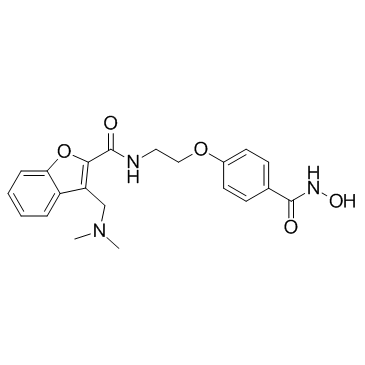
PCI-24781
CAS No. 783355-60-2
PCI-24781( CRA 024781 | CRA 24781 | PCI 24781 | Abexinostat )
Catalog No. M15956 CAS No. 783355-60-2
A broad spectrum HDAC inhibitor; inhibits pure recombinant HDAC1 with Ki of 7 nM.
Purity : >98% (HPLC)
 COA
COA
 Datasheet
Datasheet
 HNMR
HNMR
 HPLC
HPLC
 MSDS
MSDS
 Handing Instructions
Handing Instructions
| Size | Price / USD | Stock | Quantity |
| 2MG | 41 | In Stock |


|
| 5MG | 65 | In Stock |


|
| 10MG | 99 | In Stock |


|
| 25MG | 171 | In Stock |


|
| 50MG | 309 | In Stock |


|
| 100MG | 485 | In Stock |


|
| 200MG | Get Quote | In Stock |


|
| 500MG | Get Quote | In Stock |


|
| 1G | Get Quote | In Stock |


|
Biological Information
-
Product NamePCI-24781
-
NoteResearch use only, not for human use.
-
Brief DescriptionA broad spectrum HDAC inhibitor; inhibits pure recombinant HDAC1 with Ki of 7 nM.
-
DescriptionA broad spectrum HDAC inhibitor; inhibits pure recombinant HDAC1 with Ki of 7 nM; also inhibits HDAC2, HDAC3/SMRT, HDAC6, HDAC8, and HDAC10 in the nanomolar range; causes the accumulation of acetylated histone and acetylated tubulin in tumor cell lines; decreases RAD51 expression and inhibits homologous recombination.Blood Cancer Phase 2 Clinical(In Vitro):Abexinostat (CRA 024781) exhibits potent antitumor activity against a variety of tumor cell lines with GI50% ranging from 0.15 μM to 3.09 μM. Abexinostat (CRA 024781) also has an antiproliferative effect on HUVEC endothelial cells with GI50% of 0.43 μM. Abexinostat (CRA 024781) treatment causes dose-dependent accumulation of both acetylated histones and acetylated tubulin in HCT116 or DLD-1 cells, induces expression of p21, and leads to PARP cleavage and accumulation of the γH2AX. Inhibition of HDAC enzymes by Abexinostat (CRA 024781) leads to a significant reduction in the transcription of genes specifically associated with HR, including RAD51. Consistent with inhibition of HR, Abexinostat (CRA 024781) treatment results in a decreased ability to perform homology directed repair of I-SceI-induced chromosome breaks in transfected CHO cells. Abexinostat (CRA 024781) induces S phase depletion, G2 cell cycle arrest, and apoptosis in soft tissue sarcoma (STS) cells. Abexinostat (CRA 024781) induces Rad51 transcriptional repression in STS cells potentially mediated via enhanced E2F1 binding to the Rad51 proximal promoter.(In Vivo):Abexinostat (CRA 024781) parenterally administered to mice harboring HCT116 or DLD-1 colon tumor xenografts results in a statistically significant reduction in tumor growth. Inhibition of tumor growth is accompanied by an increase in the acetylation of α-tubulin in peripheral blood mononuclear cells, and an alteration in the expression of many genes in the tumors, including several involved in apoptosis and cell growth.
-
In VitroAbexinostat (CRA 024781) exhibits potent antitumor activity against a variety of tumor cell lines with GI50% ranging from 0.15 μM to 3.09 μM. Abexinostat (CRA 024781)also has an antiproliferative effect on HUVEC endothelial cells with GI50% of 0.43 μM. Abexinostat (CRA 024781) treatment causes dose-dependent accumulation of both acetylated histones and acetylated tubulin in HCT116 or DLD-1 cells, induces expression of p21, and leads to PARP cleavage and accumulation of the γH2AX. Inhibition of HDAC enzymes by Abexinostat (CRA 024781) leads to a significant reduction in the transcription of genes specifically associated with HR, including RAD51. Consistent with inhibition of HR, Abexinostat (CRA 024781) treatment results in a decreased ability to perform homology directed repair of I-SceI-induced chromosome breaks in transfected CHO cells. Abexinostat (CRA 024781) induces S phase depletion, G2 cell cycle arrest, and apoptosis in soft tissue sarcoma (STS) cells. Abexinostat (CRA 024781) induces Rad51 transcriptional repression in STS cells potentially mediated via enhanced E2F1 binding to the Rad51 proximal promoter.
-
In VivoAbexinostat (CRA 024781) parenterally administered to mice harboring HCT116 or DLD-1 colon tumor xenografts results in a statistically significant reduction in tumor growth. Inhibition of tumor growth is accompanied by an increase in the acetylation of α-tubulin in peripheral blood mononuclear cells, and an alteration in the expression of many genes in the tumors, including several involved in apoptosis and cell growth.
-
SynonymsCRA 024781 | CRA 24781 | PCI 24781 | Abexinostat
-
PathwayCell Cycle/DNA Damage
-
TargetHDAC
-
RecptorHDAC1|HDAC10|HDAC2|HDAC3/SMRT|HDAC6
-
Research AreaCancer
-
IndicationBlood cancer
Chemical Information
-
CAS Number783355-60-2
-
Formula Weight397.4244
-
Molecular FormulaC21H23N3O5
-
Purity>98% (HPLC)
-
Solubility10 mM in DMSO
-
SMILESO=C(C(O1)=C(CN(C)C)C2=C1C=CC=C2)NCCOC3=CC=C(C(NO)=O)C=C3
-
Chemical Name2-Benzofurancarboxamide, 3-[(dimethylamino)methyl]-N-[2-[4-[(hydroxyamino)carbonyl]phenoxy]ethyl]-
Shipping & Storage Information
-
Storage(-20℃)
-
ShippingWith Ice Pack
-
Stability≥ 2 years
Reference
1. Buggy JJ, et al. Mol Cancer Ther. 2006 May;5(5):1309-17.
2. Adimoolam S, et al. Proc Natl Acad Sci U S A. 2007 Dec 4;104(49):19482-7.
3. Salvador MA, et al. Clin Cancer Res. 2013 Dec 1;19(23):6520-31.
molnova catalog



related products
-
Givinostat
Givinostat or gavinostat, aslo known as ITF2357, is a potent and orally active histone deacetylase inhibitor with potential anti-inflammatory, anti-angiogenic, and antineoplastic activities.
-
Phenylethyl isothioc...
Phenylethyl isothiocyanate is an HDAC inhibitor. It potentially for the treatment of benign prostatic hypertrophy.
-
Sodium Phenylbutyrat...
Sodium Phenylbutyrate is a transcriptional regulators that act by altering chromatin structure via the modulation of HDAC activity.



 Cart
Cart
 sales@molnova.com
sales@molnova.com


